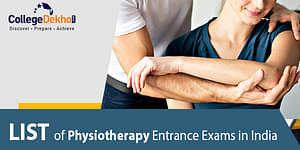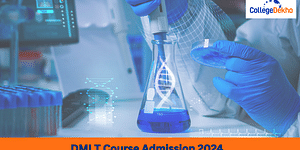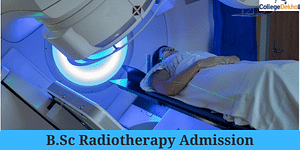MLT course Syllabus & Subjects 2025
MLT Syllabus provides a detailed insight into the procedures, diagnostic tests, and other aspects of medical consultation and treatment. The important MLT subjects include Health Education and Health Communication, Human Anatomy, Human Physiology, Bio-Medical Waste Management, Biochemistry, Clinical Haematology, etc. The MLT Syllabus is divided into 6 semesters over the duration of 3 years.
MLT Syllabus & Subjects Overview
The MLT syllabus 2025 offers a detailed insight into the course curriculum of Medical Laboratory Technology. The 3-year course curriculum is divided into six semesters in total, including core and elective subjects. The MLT syllabus 2025 comprises important topics such as Human Anatomy, Clinical Endocrinology & Toxicology Lab, Diagnostic Molecular Biology, and Biochemistry, among others.
The MLT Course structure includes a series of practical laboratory workshops and group discussions, focusing on the implementation of laboratory techniques to assist the advanced medical diagnosis and treatment. By referring to the MLT subjects in-depth, students will get an idea of how to perform clinical laboratory tests to recognize, classify, and treat illnesses and other medical conditions.
Table of Contents
MLT Course Structure
The Medical Lab Technology or BSc MLT course syllabus is a three-year programme broken into six semesters of approximately six months each. The MLT course syllabus is divided into three sections: core courses, elective subjects, and practical lab subjects. The core subjects are those that universities believe are necessary for students to learn well. Furthermore, practical lab workshops aim to allow students to apply classroom knowledge in a practical situation. The practical lab workshops are intended to expose students to all areas of medical lab technology in a hands-on situation. This will ensure that they are not scared by the rapid shift in atmosphere when they start work. The following are the BSc MLT course's teaching methodology and techniques along with the course structure:
- VI Semesters
- Core Subjects
- Elective Subjects
- Practical Lab Workshops
- Practical Workshops
- Group Projects
- Dissertation
Theory Examination
- Each BSc MLT theory paper examination will be 3 hours long and of a maximum of 70 marks.
- Each Theory paper will receive 30 marks in internal assessment.
- The number of question papers will be determined by the various subjects/areas studied during each of the three years of the BSc degree.
- To pass, a candidate must get at least 50% in each Theory paper, including internal assessment. This means that students will need to get at least 50% on each paper. This includes the 70-mark theory paper and the 30-mark internal assessment for that paper (Marks earned in Theory paper + Marks gained in internal assessment = Total Marks obtained in respect of each paper).
Practical and Viva-Voce Examination
- There will be one practical and one viva-voce examination per year. It will be held following the conclusion of the Theory examination.
- Because the pattern of practical assessment in different years of the course is not standard, the BSc Medical Laboratory Technology degree course of different fields will differ.
- To be declared pass, a candidate must achieve at least 50% marks in each Theory paper, including the internal assessment, and a minimum of 50% marks in the practical examination.
Result
Successful candidates pursuing the BSc MLT syllabus will be categorised as under:
| Those who achieve 50% or higher but less than 60% in their first, second, and third years combined. | Pass |
|---|---|
| Those who obtain 60% or above but less than 75% in the aggregate marks of the first, second, and third years combined. | Pass with I Division |
| Those who obtain 75% or higher in the aggregate marks of the first, second, and third years combined. | Pass with Honors |
Year-wise Medical Laboratory Technology Subjects
Students can refer to the year-wise Medical Laboratory Technology subjects provided below to understand the course curriculum better.
MLT Subjects 1st Year (Semester 1 & 2) | |
|---|---|
| Human Physiology-I | Human Physiology-II |
| Human Anatomy-I | Human Anatomy-II |
| Biochemistry-I | Biochemistry-II |
| Health Education and Health Communication | Bio-Medical Waste Management |
| Practical: Human Anatomy-I | Practical: Human Anatomy-II |
| Practical: Human Physiology-I | Practical: Human Physiology-II |
| Practical: Biochemistry-I | Practical: Biochemistry-II |
MLT Subjects 2nd Year (Semester 3 & 4) | |
| Pathology-I | Pathology-II |
| Clinical Haematology-I | Clinical Haematology-II |
| Microbiology-I | Microbiology-II |
| Immunology and Serology-I | Immunology and Serology-II |
| Histopathology and Histotechniques-I | Histopathology and Histotechniques-II |
| Practical: Clinical Haematology-I | Practical: Clinical Haematology-II |
| Practical: Microbiology, Immunology, and Serology-I | Practical: Microbiology, Immunology, and Serology-II |
| Practical: Histopathology and Histotechniques-I | Practical: Histopathology and Histotechniques-II |
MLT Subjects 3rd Year (Semester 5 & 6) | |
| Immunohematology and Blood Banking | Clinical Endocrinology and Toxicology |
| Clinical Enzymology and Automation | Parasitology and Virology |
| Principles of Lab Management and Medical Ethics | Diagnostic Cytology |
| Advanced Diagnostic Techniques | Diagnostic Molecular Biology |
| Practical: Diagnostic Molecular Biology | Internship Project |
| Practical: Parasitology and Virology | Practical: Clinical Enzymology |
| Practical: Diagnostic Cytology | Dissertation/Research Project |
| Practical: Advanced Diagnostic Techniques | Practical: Clinical Endocrinology and Toxicology |
Medical Laboratory Technology Syllabus Semester-wise
The Medical Laboratory Technology syllabus semester-wise has been provided below for your reference.
MLT Subjects Semester 1 | |
|---|---|
| Human Physiology-II | Practical: Human Anatomy-II |
| Human Anatomy-II | Practical: Human Physiology-II |
| Biochemistry-II | Practical: Biochemistry-II |
| Bio-Medical Waste Management | - |
MLT Subjects Semester 2 | |
| Human Physiology-I | Practical: Human Anatomy-I |
| Human Anatomy-I | Practical: Human Physiology-I |
| Biochemistry-I | Practical: Biochemistry-I |
| Health Education and Health Communication | - |
MLT Subjects Semester 3 | |
| Pathology-I | Histopathology and Histotechniques-I |
| Clinical Haematology-I | Practical: Clinical Haematology-I |
| Microbiology-I | Practical: Microbiology, Immunology, and Serology-I |
| Immunology and Serology-I | Practical: Histopathology and Histotechniques-I |
MLT Subjects Semester 4 | |
| Pathology-II | Histopathology and Histotechniques-II |
| Clinical Haematology-II | Practical: Clinical Haematology-II |
| Microbiology-II | Practical: Microbiology, Immunology, and Serology-II |
| Immunology and Serology-II | Practical: Histopathology and Histotechniques-II |
MLT Subjects Semester 5 | |
| Immunohematology and Blood Banking | Clinical Enzymology and Automation |
| Parasitology and Virology | Practical: Parasitology and Virology |
| Principles of Lab Management and Medical Ethics | Practical: Clinical Enzymology |
| Practical: Diagnostic Cytology | Diagnostic Cytology |
MLT Subjects Semester 6 | |
| Clinical Endocrinology and Toxicology | Advanced Diagnostic Techniques |
| Practical: Clinical Endocrinology and Toxicology | Diagnostic Molecular Biology |
| Internship Project | Practical: Advanced Diagnostic Techniques |
| Practical: Diagnostic Molecular Biology | Dissertation/Research Project |
MLT Core Syllabus and Subjects
The list of MLT Core Subjects has been provided below for your reference:
| MLT Core Subjects | Description |
|---|---|
| Human Anatomy | The primary goal of this MLT subject is to master the vocabulary as well as basic knowledge of cells and tissues, as well as to grasp the anatomy of the human body. This class will teach you about the anatomy and function of organs and organ systems in the normal human body. |
| Human Physiology | The primary goal of this syllabus is to integrate the fundamental understanding of cells, tissues, blood, physiological activities, and illnesses of the systems covered. |
| Biochemistry | This subject has been designed to teach the fundamentals of biochemistry, apparatus, units, equipment, and volumetric analysis in Clinical Biochemistry. |
| Pathology | The pathology curriculum is designed to provide students with a basic grasp of illnesses and their causes. Pathology's syllabus or curriculum complements and supplements the knowledge students learned in Physiology. |
| Clinical Haematology | This subject is intended to help students understand blood problems, lab diagnostics, and the numerous types of laboratory tests. |
| Microbiology | This subject provides a general overview of the history and fundamentals of microbiology, as well as information about the equipment used in microbiology. |
| Immunology and Serology | This subject has been designed to teach the fundamentals of immunity, antigens, antibodies, diverse serological reactions, techniques, and their applications in the laboratory diagnosis of human diseases. This course will also teach you about serological techniques, autoimmune illnesses, their markers, and vaccinations. |
| Histopathology and Histotechniques | Students will learn about various histotechniques, tissue specimen handling and processing, and staining processes. This topic also attempts to comprehend the theory, process, and demonstration of diverse tissue constituents and advanced instruments. |
| Immunohematology and Blood Banking | The primary objective of this subject is to educate students on the concepts of blood grouping, blood collection, infectious marker determination, compatibility testing, and quality control as they relate to blood transfusion services. |
| Clinical Enzymology and Automation | This MLT subject has been designed to provide complete knowledge of enzymes and automation in the Clinical Laboratory. |
| Parasitology and Virology | This MLT subject will teach you about the general characteristics, life cycle, and laboratory diagnosis of numerous medically significant parasites. |
| Diagnostic Cytology | Students will learn about staining processes for demonstrating various compounds and cytological examinations. This will cover unique staining techniques, as well as the handling and testing of diverse cytological specimens. |
| Principles of Laboratory Management and Medical Ethics | Students will learn about basic ethics, appropriate lab techniques, and awareness/safety in a clinical lab. |
| Clinical Endocrinology and Toxicology | This MLT subject is designed to give fundamental knowledge of hormones and poisonous compounds, as well as procedures for determining them and diagnosing related illnesses. |
| Advanced Diagnostic Techniques | This MLT Subject teaches the necessary abilities for disease detection, operation, and use of many advanced techniques. |
| Diagnostic Molecular Biology | This MLT subject provides a basic introduction to molecular biology and its techniques like PCR, RTPCR etc. |
Also Read: MLT vs Physiotherapy: Which is the Best Option After 12th?
MLT Elective Syllabus and Subjects
The list of MLT Elective Subjects has been provided below for your reference:
MLT Elective Subjects | |
|---|---|
| Disaster Management | Clinical Nutrition |
| Information and Communication Technology in Health Education | Yoga |
| Effective English | Health Care |
MLT Subjects and Syllabus: Important Books
In general, students following an MLT course syllabus always invest in reference and course books, as these can assist students to gain a thorough understanding of the subject. The reference books also assist students in easily completing the MLT subjects and syllabus. The following is a list of some of the most well-known and extensively used BSc MLT books that can assist students while they are studying the course:
- J. C. Johari: The Constitution of India- A Politico-Legal Study-Sterling Publication, Pvt. Ltd. New Delhi.
- J. N. Pandey: Constitution Law of India, Allahabad, Central Law Agency, 1998.
- Granville Austin: The Indian Constitution – Corner Stone of a Nation-Oxford, New Delhi, 2000.
- Health Education – A new approach – L. Ramachandran & T. Dharmalingan
- Health Communication in the 21st Century, By Kevin B. Wright, Lisa Sparks, H. Dan O'Hair, Blackwell publishing limited, 2013, first edition
- Health Communication: From Theory to Practice, By Renata Schiavo, Published by Jossey Bash.
- Health Communication, R.D. Karma Published by Mohit Publications 2008.
- Counseling Skills for Health Care Professionals, 1st Edition, Rajinikanth AM, Jaypee Brothers, 2010.
- The Book of Hospital Waste Management: Dr D.B. Acharya & Dr Meeta Singh (Minerva Press, New Delhi)
- Hospital Waste Management & its Monitoring: Madhuri Sharma (Jaypee Brothers, Medical Publishers (P) Ltd. New Delhi)
MLT Syllabus: Teaching Methodology
MLT Syllabus also includes different teaching styles that help students in understanding the course syllabus. In order to gain an well-rounded education and hands-on experience, one should focus on studying the MLT Subjects thoroughly, by Participating in internships, workshops, etc to impart practical knowledge. The MLT Course teaching methods include both traditional and modern teaching methods. Here are some of the common teaching methodology and techniques for MLT courses:
- Educational Technologies
- Traditional Classroom Based Teaching
- Project Based Learning
- Guest Lectures
- Workshop
- Webinars
- Group Discussion
Popular Courses
- Courses
- MLT Course
- Syllabus & Subjects










